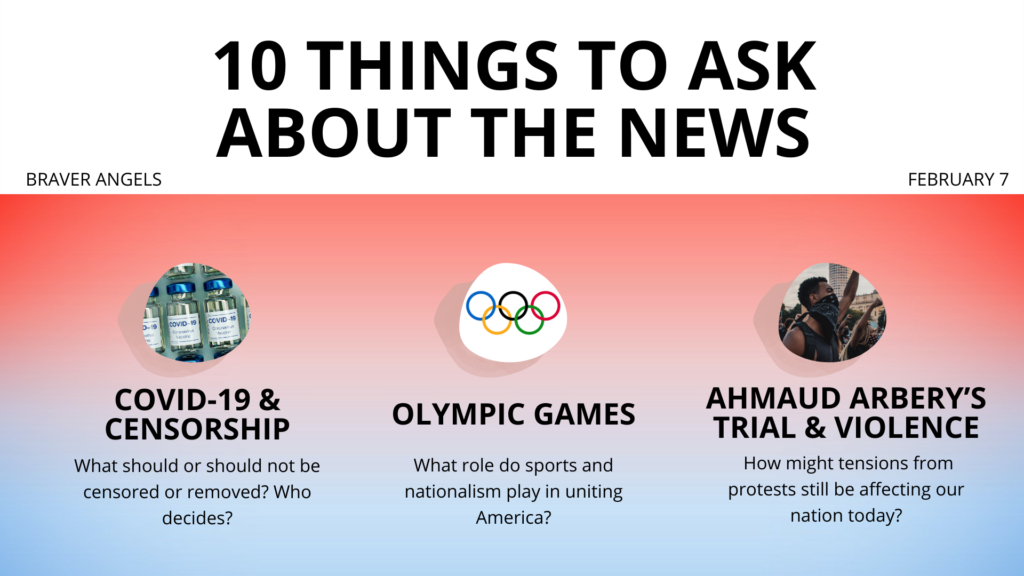Black History Month Fact: In light of the 2022 Winter Olympics in Beijing, this week’s Black History Month fact is dedicated to Jesse Owens. If you don’t know who Jesse Owens is, he is best known for winning four gold Olympic medals at the 1936 Olympic Games hosted by Adolf Hitler in Berlin, Germany. Setting the world record in the running broad jump and becoming known as the most successful athlete at the Games, Owens was credited with defeating Hilter’s intentions to use the Games to demonstrate Aryan superiority.
10 Things to Ask About the News
The Continued Discussion of Joe Rogan & Censorship in the Era of COVID-19
The discussion of free speech and national welfare continues to cause debates across America. At the center of it is Joe Rogan, Spotify, and the numerous celebrities that have stood up in either support or protest of his controversial podcast. On the topic of Joe Rogan, however, there’s been circulation on the internet of clips of Joe Rogan using racial slurs in his previous podcast episodes. Rogan posted an apology video in response to the issue and has since taken down some of his older episodes. Spotify has also removed about 70 of his episodes which have used the slur.
Engagement Questions
- While the episodes removed were not related to COVID-19, we must ask ourselves: what should or should not be censored or removed? When is it too much?
- When discussing censored material, consider these:
- Curse words on a kid’s show
- Articles questioning government actions
- George Orwell’s 1984 in school libraries
- Pornographic content on a recommended YouTube feed
- When discussing censored material, consider these:
- Who should get the power to determine what gets censored, if anything at all? Should it be the government? The people? Private media companies like Spotify?
- What might be the negative effects of potentially promoting disinformation? What might be the negative effects of potentially censoring too much information? Or of censoring only a specific type of information? How do you weigh what’s more important?
Nationalism & Sports: Olympic Games & Upcoming Super Bowl
So the 2022 Winter Olympic Games started last Friday. Julia Marino brought us our first silver in women’s slopestyle snowboarding, and there are high expectations as athletes slowly make their way onto the big screen. After four years since the last Winter Games, people all over the world are gathering together to cheer on their own national teams and watch our athletes compete. And as if there wasn’t already enough space on the couch, next Sunday is also the Super Bowl. One of the nation’s most-watched sporting events, the annual NFL championship game is bound to bring lots of hype and excitement for American watchers all across the country.
Meanwhile, the U.S. and nine other countries continue to protest China’s human rights abuses with diplomatic boycotts in the 2022 Olympic Games. Since 2017, there have been reports of millions of Uyghurs—a Muslim group in northwestern China—sent to internment camps, subjected to torture, rape, and forced sterilization. In response, the U.S. State Department has labeled the atrocity a genocide against Uyghurs and the Biden administration announced a diplomatic boycott against China. In this diplomatic boycott, U.S. athletes are still sent to compete but no U.S. diplomats will attend the games.
More controversy surrounds the 2022 Winter Olympics when 18-year-old skier, rising model, and Chinese-American, Eileen Gu, decided to represent China in the current Games. Eileen Gu was born in San Francisco, California to her Chinese mother and American father. Now that she has won gold for her mother’s native country, the issue calls into question the lines between ethnicity, nationality, patriotism and loyalty.
Engagement Questions
- What role do sports—and subsequently nationalism—play in uniting America? Why might it be important or unimportant?
- How does it affect your everyday life? Does it unite and/or build your own communities? Or tear it apart?
- Could nationalism be a source of exclusivity? Particularly towards foreign communities in America? Could it also play a part in dividing America?
- Does the diplomatic boycott work? In general, do protests still work anymore? How do we get pressing issues to the discussion table?
- What defines someone’s patriotism for those where the lines of nationality and ethnicity blur? Where should a citizen’s loyalty lie? In one’s nationality or ethnicity? Or is it up to an individual themselves to decide? Where do the lines blur?
Ahmaud Arbery’s Trial & Violence
Ahmaud Arbery’s death in 2020 was one of many that sparked the wide-spread concern for the increased violence and brutality towards Black Americans. The trial for Travis McMichael, Greg McMichael, and William “Roddie” Bryan, the three white men who chased down and killed Ahmaud, began with jury selection. They are currently convicted of murder and sentenced to life in prison. Moreover, in Minneapolis—where George Floyd, the rallying cry for the BLM movement—was killed, an armed 22-year-old black man, Amir Locke, was killed in his apartment by Minneapolis police. More than 1,000 people marched on Saturday to demand action against the police’s “no-knock” warrant.
Engagement Questions
- Almost two years after the large-scale Black Lives Matter protests, how might tensions still be affecting the divides in our nation today? With years of consistent protesting out on the streets, from BLM to anti-lockdown to anti-vaccines, what can we hold onto to keep the American people united?
- Has there been change since the BLM protests? Does the act of protesting work to create government action?
Editor’s Note: Every week, BA Media intern Janus Kwong compiles a briefing document for our national media staff’s reference, a guide for thinking through the major news items we and our fellow Americans might have at top of mind. These documents don’t assert a party-line or standard; they lay out some themes and guide us through key questions, and like the best of our work, they bring us a little closer to understanding things with a spirit of goodwill, through a commitment to process. They shouldn’t be seen as fact-sheets or strategic assessments, but as reflective little guides to help us cultivate the Braver Angels Way as we approach any issue at all. We in the media team are reflecting on these questions ourselves, and we invite interested BA members to do so too, and share your thoughts with us at media@braverangels.org or in the comments. -LNP




